PENGUIN  CLASSICS
CLASSICS
ESSAYS AND APHORISMS
ARTHUR SCHOPENHAUER was born in Danzig in 1788, where his family, of Dutch origin, owned one of the most respected trading houses. In 1793 the business moved to Hamburg, and in 1804 Arthur, who was expected to inherit it, was apprenticed as a clerk to another Hamburg house. He hated the work, so in 1807, two years after his father's suicide and the sale of the business, he enrolled at the grammar school at Gotha. In 1809 he entered Gttingen University to study medicine and science; the following year he took up philosophy. In 1811 he transferred to Berlin to write his doctoral thesis (1813). During the next four years he lived in Dresden and wrote The World as Will and Representation (1818), a complete exposition of his philosophy. Although the book failed to sell, Schopenhauer's belief in his own philosophy sustained him through twenty-five years of frustrated desire for fame. During his middle life, he travelled widely in Europe. In 1844 he brought out a greatly expanded edition of his book, which after his death became one of the most widely read of all philosophical works. His fame was established in 1851 with the publication of Parerga and Paralipomena, a large collection of essays, dialogues and aphorisms. From 1833 until his death from a heart attack in 1860 he lived in Frankfurt-am-Main.
R . J. HOLLINGDALE translated eleven of Nietzsche's books and published two books about him; he also translated works by, among others, Schopenhauer, Goethe, E. T. A. Hoffman, Lichtenberg and Theodor Fontane, many of these for Penguin Classics. He was the honorary president of the British Nietzsche Society. R. J. Hollingdale died on 28 September 2001. In its obituary The Times described him as Britain's foremost postwar Nietzsche specialist and the Guardian paid tribute to his inspired gift for German translation. Richard Gott wrote that he brought fresh generations through fluent and intelligent translation to read and relish Nietzsche's inestimable thought.
PENGUIN BOOKS
Published by the Penguin Group
Penguin Books Ltd, 80 Strand, London WC2R 0RL, England
Penguin Group (USA) Inc., 375 Hudson Street, New York, New York 10014, USA
Penguin Books Australia Ltd, 250 Camberwell Road, Camberwell, Victoria 3124, Australia
Penguin Books Canada Ltd, 10 Alcorn Avenue, Toronto, Ontario, Canada M4V 3B2
Penguin Books India (P) Ltd, 11 Community Centre, Panchsheel Park, New Delhi 110 017, India
Penguin Books (NZ) Ltd, Cnr Rosedale and Airborne Roads, Albany, Auckland, New Zealand
Penguin Books (South Africa) (Pty) Ltd, 24 Sturdee Avenue, Rosebank 2196, South Africa
Penguin Books Ltd, Registered Offices: 80 Strand, London WC2R 0RL, England
www.penguin.com
This translation first published 1970
Reprinted with new Chronology and Further Reading 2004
Translation and introduction copyright R. J. Hollingdale, 1970
Chronology and Further Reading copyright Christopher Janaway, 2004
All rights reserved
Except in the United States of America, this book is sold subject to the condition that it shall not, by way of trade or otherwise, be lent, re-sold, hired out, or otherwise circulated without the publisher's prior consent in any form of binding or cover other than that in which it is published and without a similar condition including this condition being imposed on the subsequent purchaser
978-0-141-92175-4
LIST OF CORRESPONDENCES
The present selection of Schopenhauer's Essays and Aphorisms is taken from Parerga und Paralipomena. Kleine philosophische Schriften. Zweiter Band: Vereinzelte, jedoch systematisch geordnete Gedanken ber vielerlei Gegenstnde, in the edition of Eduard Grisebach. In the following list of correspondences the first number is that of the section in the present selection, the second that of the same section in the original. Most sections are abridged.
1:148, 2:149, 3:150, 4:151, 5:152, 6:153, 7:154, 8:155, 9:156 (Kap. XII: Nachtrge zur Lehre vom Leiden der Welt).
1:142, 2:143, 3:144, 4:145, 5:146, 6:147 (Kap. XI: Nachtrge zur Lehre von der Nichtigkeit des Daseyns).
1:61, 2:62, 3:63, 4:65, 5:67 (Kap. IV: Einige Betrachtungen ber den Gegensatz des Dinges an sich und der Erscheinung).
1:161, 2:162, 3:163, 4:164, 5:166, 6:171, 7:172 (Kap. XIV: Nachtrge zur Lehre von der Bejahung und Verneinung des Willens zum Leben).
1:134, 2:135, 3:136, 4:137, 5:138, 6:139, 7:140, 8:141 (Kap. X: Zur Lehre von der Unzerstrbarkeit unseres wahren Wesens durch den Tod).
1:157, 2:158 (Kap. XIII: Ueber den Selbstmord).
1:362, 2:363, 3:364, 4:365, 5:366, 6:367, 7:368, 8:369, 9:370 (Kap. XXVII: Ueber die Weiber).
1:257, 2:258, 3:259, 4:260, 5:262, 6:263, 7:264, 8:265, 9:267, 10:269, 11:270, 12:271 (Kap. XXII: Selbstdenken).
: a Dialogue 174 (Kap. XV: Ueber Religion).
23:53, 24:54, 25:57, 26:60 (Kap. III: Den Intellekt berhaupt und in jeder Beziehung betreffende Gedanken).
1:109, 2:110, 3:111, 4:113, 5:114, 6:115, 7:116, 8:117, 9:118 (Kap. VIII: Zur Ethik).
1:121, 2:122, 3:123, 4:124, 5:125, 6:126, 7:127, 8:128 (Kap. IX: Zur Rechtslehre und Politik).
1:205, 2:206, 3:207, 4:208, 5:209, 6:210, 7:212, 8:213, 9:217, 10:218, 11:220, 12:227, 13:228 (Kap. XIX: Zur Metaphysik des Schnen und Aesthetik).
1:305, 2:307, 3:308, 4:310, 5:312, 6:313, 7:315, 8:317, 9:320, 10:321, 11:324, 12:325, 13:326, 14:328, 15:330, 16:331, 17:333, 18:335, 19:336, 20:340, 21:341, 22:342, 23:343, 24:344, 25:346, 26:350, 27:357, 28:358 (Kap. XXVI: Psychologische Bemerkungen).
1:175, 2:176, 3:177, 4:178, 5:179, 6:180, 7:181, 8:181A (Kap. XV: Ueber Religion).
1:237 (Kap. XX: Ueber Urtheil, Kritik, Beifall und Ruhm); 2:272, 3:273, 4:274, 5:275, 6:281, 7:282, 8:283, 9:284, 10:285, 11:286, 12:287 (Kap. XXIII: Ueber Schriftstellerei und Stil); 13:292, 14:293, 15:294, 16:295, 17:296A, 18:297 (Kap. XXIV: Ueber Lesen und Bcher).
1A:71, B:74, C:80, D:94, E:96, F:99 (Kap. VI: Zur Philosophie und Wissenschaft der Natur); 2:69 (Kap. V: Einige Worte ber den Pantheismus); 3A:197, B:198, C:199, D:200, E:203, F:203A, G:204 (Kap. XVIII: Einige mythologische Betrachtungen); 4:233 (Kap. XIX: Zur Metaphysik des Schnen und Aesthetik); 5A:238, B:239, C:240, D:242 (Kap. XX: Ueber Urtheil, Kritik, Beifall und Ruhm); 6A:244, B:245, C:248, D:249, E:255 (Kap. XXI: Ueber Gelehrsamkeit und Gelehrte); 7A:372, B:373, C:374, D:375 (Kap. XXVIII: Ueber Erziehung); 8:298 (Kap. XXV: Ueber Sprache und Worte); 9:377 (Kap. XXIX: Zur Physiognomik); 10:378 (Kap. XXX: Ueber Lrm und Gerusch); 11A:385, B:387, C:388, D:399, E:390 (Kap. XXXI: Gleichnisse, Parabeln und Fabeln).
CHRONOLOGY
178822 February : Arthur Schopenhauer born in Danzig (now Gdansk), the son of the Hanseatic merchant Heinrich Floris Schopenhauer and Johanna, ne Trosiener.
1793 The family moves to Hamburg in response to the imminent annexation of Danzig by the Prussians.
1797 Sister Adele is born. Schopenhauer begins a two-year stay in Le Havre with the family of one of his father's business partners.
1799 Returns to Hamburg and attends Runge's private school for the next four years.
1803 Agrees to enter career as a merchant and accompanies his parents on a tour of Europe (Holland, England, France, Switzerland, Austria).
JuneSeptember : A boarder in Thomas Lancaster's school in Wimbledon.
1804 Apprenticed to two Hanseatic merchants in Hamburg.
180520 April : His father dies, probably by suicide.
1806 Johanna Schopenhauer moves with Adele to Weimar, where she establishes herself as a popular novelist and literary hostess whose salon Goethe attends.


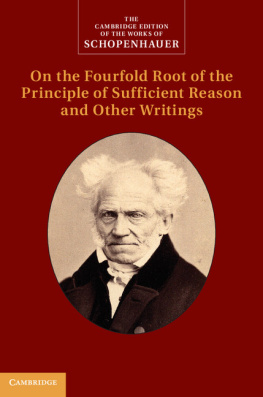
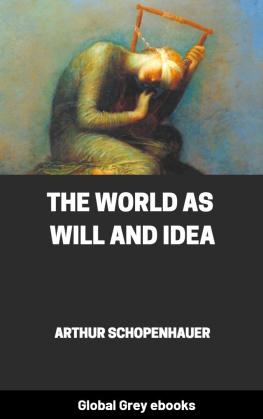
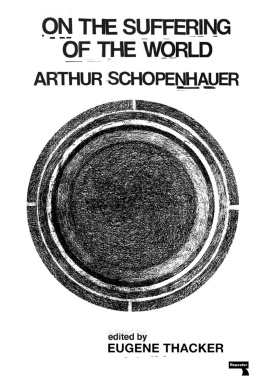
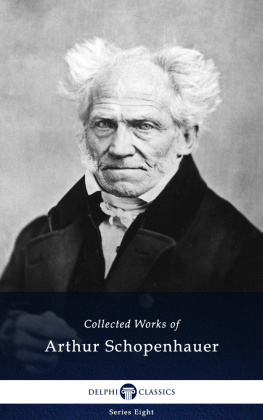
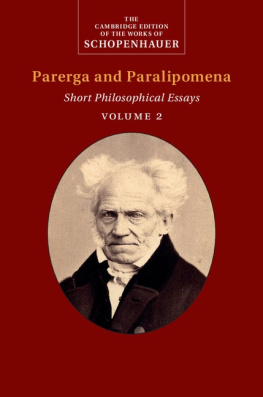
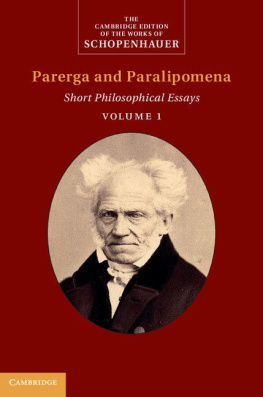
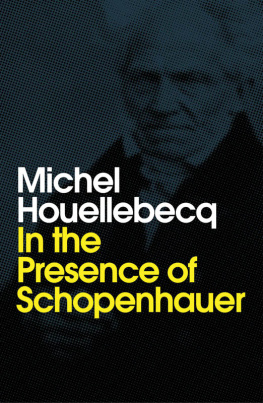
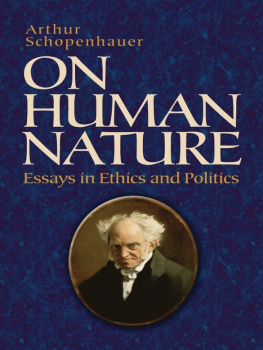
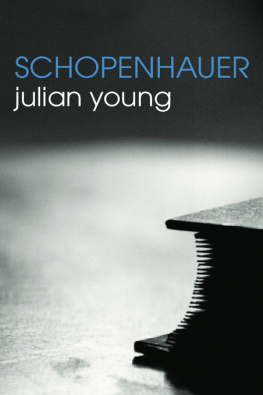
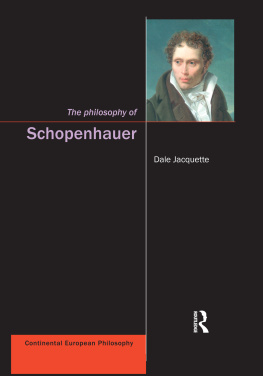
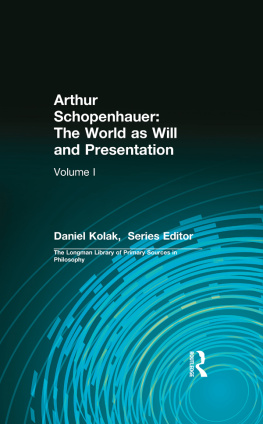
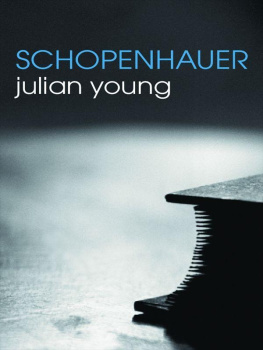
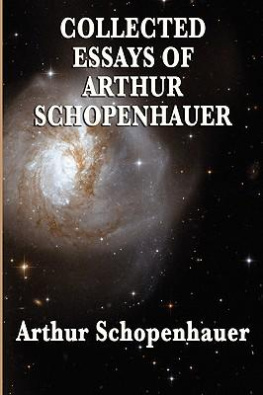
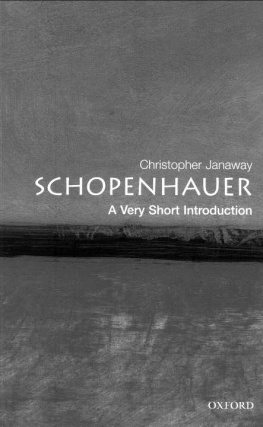
 CLASSICS
CLASSICS